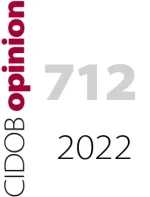Putting decentralised cooperation back on the Euro-Latin American agenda

In the midst of a recovery in which urban innovations have gained unprecedented importance, the European Union should redouble its commitment to decentralised cooperation and place it at the heart of Euro-Latin American dialogue. The proven results of this dynamic, innovative practice show its enormous potential to improve the quality of public policies in both regions.
This article was previously published in TIP Magazine.
Relations between cities in Latin America and Europe have traditionally been rich and dynamic. As well as shared history and strong cultural, social, economic and political ties, they have been brought even closer by the need to address similar challenges. Networks of different types and more or less formalised bilateral relations have proliferated with proven results. For years, the European Union has encouraged exchange and the development of shared solutions, some of which have been highly innovative. However, over the last decade, European institutional support for decentralised cooperation has diminished to the point of becoming marginal. But while the initial signs are unpromising, it remains to be seen whether cities’ central role in managing the pandemic, in addressing the twin, climate and digital, transition and in fighting inequalities makes this form of cooperation a key European priority in the near future.
For some time now, Latin American cities have been cultivating relations with other regions of the world, especially in North America and Asia. And yet the links with their European counterparts retain a special quality. Sociocultural and political similarities and the weight of economic relations facilitate exchange. And when it comes to addressing solutions to shared problems, bilateral relations between the major – and even intermediate – cities in the two regions remain fluid and constant. For their part, bi-regional city networks such as the Centro Iberoamericano de Desarrollo Estratégico Urbano (CIDEU), the Unión de Ciudades Capitales Iberoamericanas (UCCI) and the Alianza Eurolatinoamericana de Cooperación entre Ciudades (AL-LAs), as well as global ones like United Cities and Local Governments (UCLG), Metropolis, C40 and ICLEI, provide meeting spaces that are useful not only for exchanging solutions, but also for working on alliances and influencing the international political agenda.
For years, the European Commission has encouraged, facilitated and supported this city-to-city cooperation. Over its three phases, the URB-AL Programme was a fundamental tool not only for promoting bi-regional cooperation between local governments but, above all, for improving the quality of public policies in key areas such as democratic governance, gender equality, social cohesion, local economic development and the fight against climate change. URB-AL placed city networks at the heart of the agenda and left a legacy of numerous projects with proven results, like the Observatory for Decentralised Cooperation, which remains a key reference point today, and a highly valuable repository of studies and research that has served to highlight the major capacity for territorial innovation in the two regions.
As well as URB-AL, which came to an end in 2013, the thematic programme “Civil Society Organisations and Local Authorities”, whose scope is global, has in recent years financed bilateral partnerships between the main Latin American and European cities and prominent multilateral projects like AL-LAs, a benchmark in the internationalisation of urban policies. In a similar vein, the International Urban and Regional Cooperation programme (IURC) promotes city-to-city cooperation in some countries in the region (Argentina, Brazil, Chile, Colombia, Mexico and Peru). Unlike the previous programmes, however, it lacks the resources to finance the implementation of pilot projects.
The launch of the new Neighbourhood, Development and International Cooperation Instrument (NDICI), to be implemented by the European Union in the 2021–2027 budget period, seems likely to change the landscape considerably. The European institutions have reached an agreement to mainstream the issue and allocate a minimum of €500 million to the local and regional governments of partner countries around the world. The resources will be channelled through country and regional programming instruments. Nevertheless, mobilising European resources for cooperation projects between cities in Europe and Latin America seems likely to be difficult. Country programmes are rolled out via national authorities and everything suggests that no regional programmes will be established that focus specifically on the urban sphere, while the end of the thematic programme for local authorities has already been announced.
That the EU is to cease facilitating and financing decentralised cooperation between Europe and Latin America is concerning. It could undermine the necessary empowerment of local governments at a time when – and on this there is consensus – they must play a leading role in promoting strategies to advance on climate neutrality, the digital transition and the fight against all kinds of inequality. Meanwhile, the decentralisation agenda has suffered a number of setbacks in some Latin American and European countries.
In this context, local governments and their representative networks and associations must continue working to strengthen their ties and influence the European institutions to place decentralised cooperation back on their list of priorities. A number of options appear viable: strengthening the IURC programme and directing it towards financing pilot projects and expanding its coverage to the entire region; opening up the new versions of regional programmes like EUROsociAL+ and EUROCLIMA+ to the direct participation of cities; and empowering mechanisms that facilitate the link between country programmes and decentralised cooperation. Programmes like Interreg Europa could provide inspiration for all of this.
At any rate, there are strong reasons for taking advantage of the dynamic relations between European and Latin American cities in order to ensure that decentralised cooperation regains visibility as a tool for empowering local governments and transforming urban and territorial realities. In a context of extreme complexity and uncertainty like today’s, in which proximity policies will be key to advancing the recovery process, placing the decentralisation and sustainable urban and territorial development agenda at the heart of Euro-Latin American political dialogue should be a priority and an act of collective responsibility.
Keywords: cities, decentralised cooperation, EU, Latin America, urban innovations, URB-AL
E-ISSN: 2014-0843